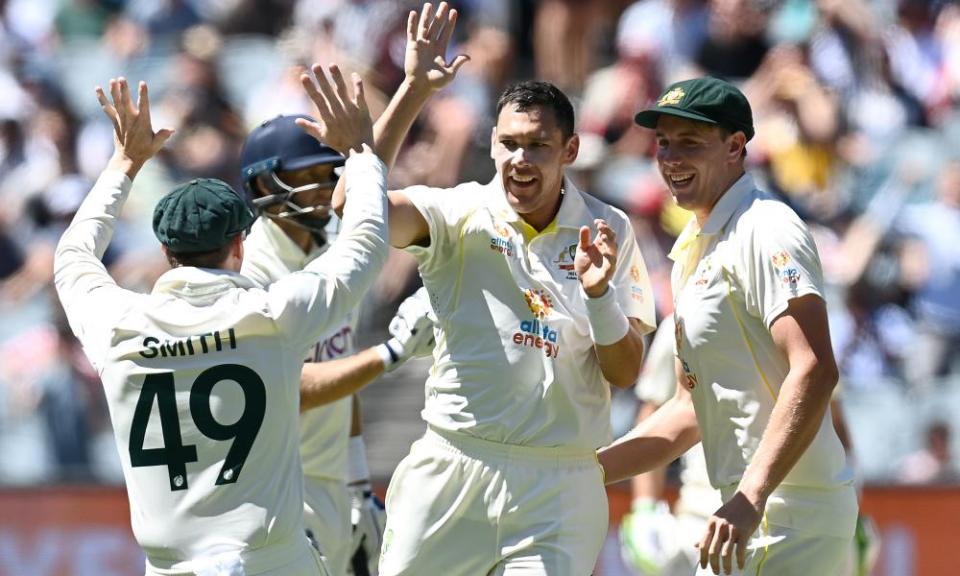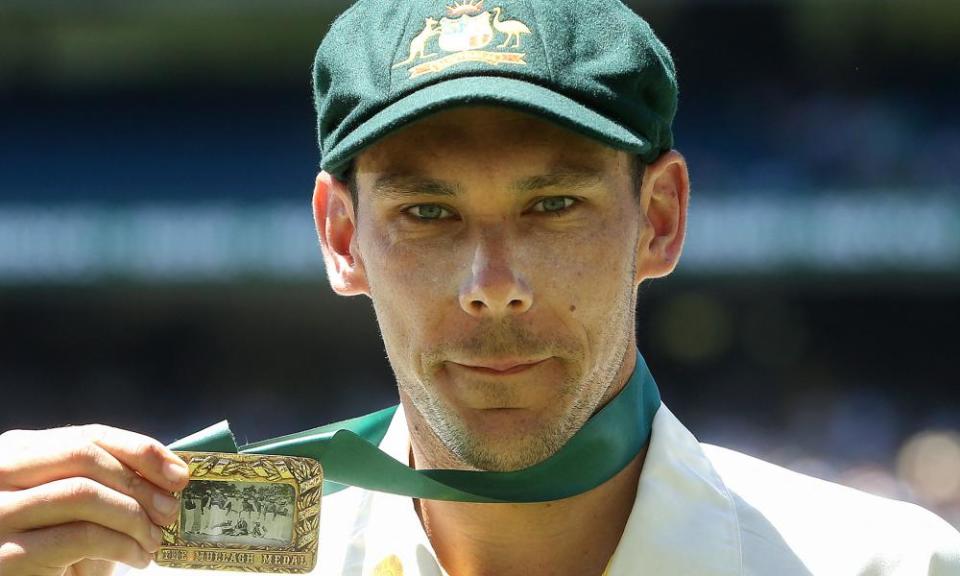Scott Boland’s perfect day sums up Australia’s seamless Ashes series

Fast bowler tore through meek England to win Ashes in rapid fashion but tougher tests await the hosts in Asia next year
At the end of 2002, Australia retained the Ashes inside 10 days. In 2021, the official figure will be 12 days. But that includes a surrender just after lunch on the fourth day in Brisbane, and well before lunch on the third day in Melbourne, scarcely enough in each case to be included as a day’s play.
Related: After awful Ashes defeat, will England ever be good at Test cricket again? | Jonathan Liew
On Monday, in these pages, we wrote about the extraordinary emergence of Scott Boland. On the second evening, his two wickets before stumps set the match on a path towards an inevitable conclusion. On the third day, Boland realised that conclusion himself, taking four more wickets to round out an astonishing second innings on debut, finishing with six wickets for seven runs. The second Indigenous man to play Test cricket for Australia won the Johnny Mullagh medal named for his long-ago predecessor, Unaarrimin, in an extraordinary moment of symbolic and practical significance.
In raw numbers, only once in Test history has a six-wicket haul cost fewer runs, across 144 years of the game. More than anything, this emphasises how right everything has gone for Australia, even when things have gone wrong. The home team would have gone into this series expecting Josh Hazlewood, Patrick Cummins and Mitchell Starc to play as many matches as possible, with a couple of rotations where required.
Instead, Hazlewood has been missing since the first game. The captain Cummins missed the second game, and only the notionally least reliable of the three, Starc, has played every match. And yet Starc has led the lot, bowling an excellent line with consistency, reliability and perseverance, despite the doubts thrown his way before the contest commenced.
Behind him, every substitute that Australia has employed has delivered above expectations. Jhye Richardson took five for 42 in the final innings in Adelaide. Michael Neser was his support act, doing everything he could in exactly the style that we have come to expect from him. Then when the pair were rested, there was Boland as the Melbourne specialist polishing off a usually attritional Test in the shortest possible time.

Perhaps this is the benefit of playing at home, where most things can work out well for the home team. But that was not the case for Australia against India in the previous home summer, in which India found ways to survive and then prosper against the local attack.
This leads to the final question, which is how good this Australia team actually is. A couple of months ago, the focus was on the coach Justin Langer’s fractious relationship with senior player in the national team. A few weeks ago, the focus was on the former captain Tim Paine’s resignation amid stories that still require closer examination. Now, having retained the Ashes in straight sets, as has been the practice in several recent series, glowing reviews will be written. But that could be very different by the end of 2022, after the Australian players have travelled to Pakistan, Sri Lanka and India.
There is no clear way to define this team’s quality against the lack of quality of England’s tourists. The visiting captain, Joe Root, spoke after the Melbourne loss about pride in the badge and the need to deliver. But that can’t mean much when players are not given adequate preparation for a contest. Nobody batting in the county championship in the last couple of years has demanded a place in England’s team. It looks increasingly evident that the competition itself is not fit for purpose.
But that is equally the case when Australian players tour Asia, and has been for a long time. Recent visits include a loss to Pakistan in 2018, a tie in Bangladesh in 2017, a loss to India earlier the same year, and a whitewash by Sri Lanka in 2016. There will be deserved celebrations after winning the Ashes at home, but far sterner tests await in the year to come.
As for England, the problems are vast and complicated. Neither Root nor coach Chris Silverwood wanted to damn their current squad, but neither was prepared to deny that there are broader systemic problems in providing England players who can handle the challenges of overseas tours. There are two Tests remaining in this Ashes series, but neither can change anything in terms of these bigger problems.
For now, Australia’s team can enjoy the primacy of home conditions. There is little more significant than the fact that the home team’s most questionable player in the series, Marcus Harris, made 76 in Melbourne and outscored England’s second innings on his own. What can a visiting team do from there? With the series decided, there are bigger challenges now awaiting Australia. The meaning of beating England, given England’s now evident weaknesses, remains very much a point for debate.

 Yahoo Sport
Yahoo Sport 






































